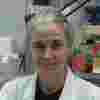Off the clock: understanding immune cell’s circadian rhythm to improve anti-tumour therapies
Cancer types:
General cancer research
Project period:
–
Research institute:
Universitat Pompeu Fabra
Award amount:
£213,887
Location:
Spain

Professor Cristina Lopez-Rodriguez and her team want to understand how internal clocks affect the ability of immune cells to fight off cancer. They hope that a better understanding of this mechanism could provide ways to improve anti-cancer strategies.
Meet the scientist
Professor Cristina Lopez-Rodriguez studied Biology at her hometown Universidad de Santiago de Compostela in the northwest of Spain, before embarking on a research journey that took her from Madrid via Harvard Medical School in Boston to Barcelona, where she currently researches and teaches at the Universitat Pompeu Fabra.
Apart from research, she enjoys cooking, travelling and hiking. One of her favourite movies is Blade Runner and she is an avid reader, enjoying everything from reports of Arctic explorations (Ernest Shackelton, 1914) to French novelists (Fred Vargas).

The science
We all have internal clocks. They synchronise functions such food intake, sleep, which hormones we secrete and how we use our energy, depending on whether it’s night or day. Even your immune system follows its own molecular clock, adjusting its activity to the time of day when it’s more likely to be needed. Research has unravelled the importance of our inner clocks for germ defence and inflammation, but its role is less clear in cancer.
One recent cancer treatment success story has been the use of immunotherapies. These treatments support and kick-start the patient’s own immune system to kill tumours. Immunotherapies have shown effectiveness against many different types of cancer, but are by no means a magic bullet.
Professor Cristina Lopez-Rodriguez thinks that the immune system's internal clock influences its ability to fight off cancer. She and her team are now trying to find how the time of day influences the strength of anti-tumour inflammatory immune responses and how this would affect the efficacy of anti-tumour treatments.
I think that the questions asked in discovery research are very important to orient directions for applied research. Both discovery and applied research are complementary, and while applied research often needs a strong foundation of well-consolidated knowledge, discovery research can explore more uneven grounds and help consolidate the terrain from which applied research can follow.




